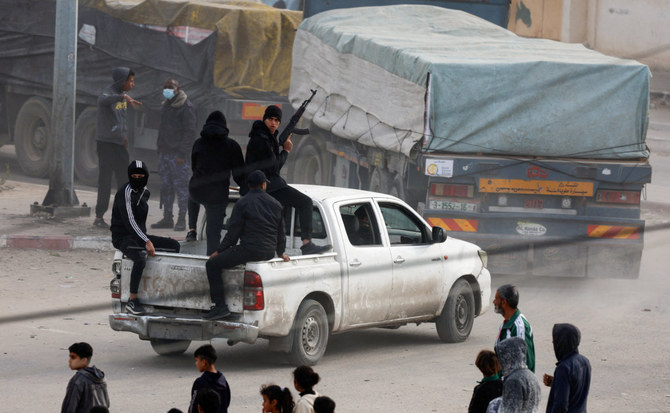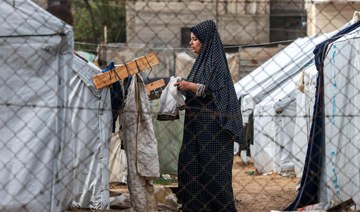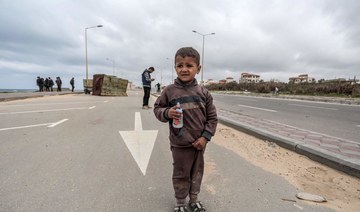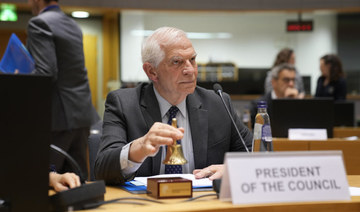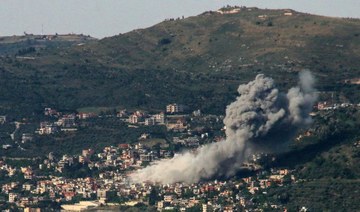CAIRO: Armed and masked men from an array of clans and factions have started providing security for aid convoys in Gaza as Hamas tries to keep its clout in the enclave, Palestinian officials and sources in the militant group say.
Video footage obtained by Reuters showed a convoy of trucks entering Gaza City with foreign aid overnight, watched by several men armed with AK-47 assault rifles and others wielding sticks.
With Israeli forces sworn to eliminate Hamas since its deadly Oct. 7 raid on Israel, it has become highly risky for anyone linked to the Islamist group to emerge into the open to provide security for aid deliveries to desperate civilians.
So numerous clans, civil society groups and factions — including Hamas’s secular political rival Fatah — have stepped in to help provide security for the aid convoys, according to the Palestinian officials and Hamas sources.
They did not identify the clans and factions but said Hamas’ ability to rally such groups behind it over security showed it retains influence, and that efforts by Israel to build its own administrative system to keep order in Gaza were being resisted.
“Israel’s plan to find some clans to collaborate with its pilot projects of finding an alternative to Hamas didn’t succeed but it also showed that Palestinian resistance factions are the only ones who can run the show, in one way or another,” said a Palestinian official who asked not to be named.
An Israeli military spokesperson declined comment, saying specific rules of engagement in an active war zone could not be publicly discussed.
CIVIL ORDER STRAINED
Israel’s offensive in Gaza has killed over 30,000 Palestinians, according to Gaza health officials, and reduced much of the enclave to rubble. The campaign was launched in response to Hamas’s Oct. 7 attack, in which Israel said 1,200 people were killed and more than 200 were taken hostage.
Hamas, which has run Gaza since 2007, has built its popularity on social services, education programs and charities it offers impoverished Gazans.
With public order strained and civil police having concerns about providing security for fear of being targeted by the Israeli military, the safe distribution of supplies has become increasingly hard to guarantee.
Dozens of Palestinians were killed last month after crowds surrounded a convoy of aid trucks entering northern Gaza and Israeli troops opened fire. Israel said many victims had been trampled or run over, and that it opened fire only after its troops felt threatened by the advancing crowd.
A senior Israeli official, speaking to Reuters on condition of anonymity, said Israel was open in principle to Palestinians securing areas of the Gaza Strip cleared of Hamas, and could even approve the formation of an armed police.
“But this is more of a day-after (the war) enterprise than something that could be implemented as a policy right now. We would need to be assured that the individuals have no Hamas ties — and certainly that they are not directly or indirectly serving Hamas interests,” the Israeli official said.
Juliette Touma, spokesperson for the UN refugee agency UNRWA, had no information about masked men securing convoys.
Jamie McGoldrick, UN Humanitarian Coordinator for the Occupied Palestinian Territory, said the United Nations was not working with clans.
“We’ve been trying to get the Blue Police (Palestinian civil police) back on track again. There have been a number of incidents where the blue police have been targeted by Israel, because they regard them as part of the Hamas infrastructure,” he said.
“And so we are trying to find the best way suitable to have delivery of assistance into the north and other parts of Gaza Strip. That is a combination of using community groups, etc. And where we can use the police in a discreet manner as well.”
Shimon Freedman, spokesperson for the Israeli Defense Ministry liaison agency for Palestinian civilian affairs, said the distribution of aid in Gaza was the responsibility of international organizations.
“While we assist in that distribution and we help coordinate those convoys and allow them to go through our humanitarian corridor, the aspects of that are up to them,” he said.
SENIOR POLICE CHIEF KILLED
Israel said on Monday it had killed Brig. Gen. Faiq Abdulraouf Al-Mabhouh, a senior police chief in central Gaza, during a raid on Al Shifa Hospital in Gaza City.
Hamas said Mabhouh was responsible for protecting and securing aid trucks in Gaza, and had been coordinating with the UN over the protection of the distribution of aid.
On Tuesday, an Israeli airstrike on a home in northern Gaza Strip killed another officer tasked with aid delivery security, that also killed his wife and children, health officials said.
Late on Tuesday, 30 people from groups formed by local clans to secure the entry of aid trucks into Gaza City were killed by an Israeli strike while waiting for aid at a major roundabout, Hamas media said. Israel had no immediate comment.
Hamas accused Israel of carrying out the attacks “to influence the protection of aid and increase chaos as sought by the occupation (Israel).” Israel has denied accusations of using starvation as a weapon of war.
Separate statements issued in the name of the National Assembly of Palestinian Tribes, and Palestinian factions, condemned Israel’s killing of police officers and members of the popular protection committees in the past two days.
“We affirm that we stand with all our tribes, clans and families in the Gaza Strip behind our national Palestinian police and the supporting protection committees,” said the statement of the clans.
As part of plans for running Gaza after the war, Israeli Prime Minister Benjamin Netanyahu has considered empowering local representatives not affiliated to Hamas or other militant groups, but it is unclear who those people might be.
Gaza has large traditional family clans, affiliated with political factions including Hamas and Fatah, which dominates the Palestinian Authority in the Israeli-occupied West Bank.
Some of the larger clans are widely believed to be heavily armed. Some clan leaders have publicly rejected Israel’s plan and said they cannot take the place of UN relief agencies helping Palestinian refugees, or be a substitute for local authorities.



